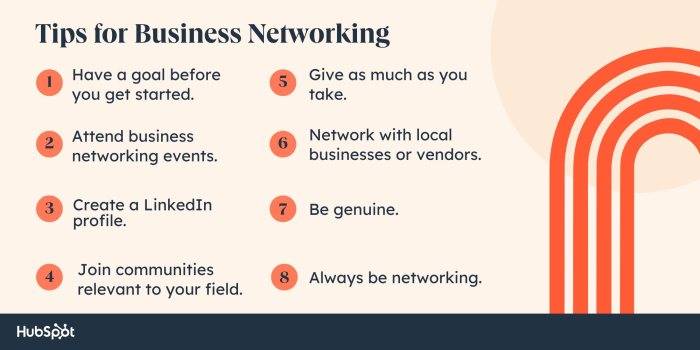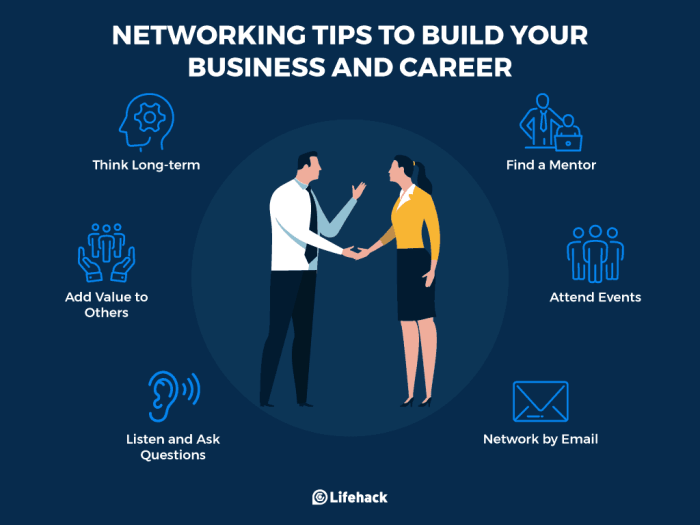Networking Tips for Professionals: Unlocking Opportunities and Growth begins with shedding light on the importance of networking in the professional world, showcasing how it can lead to new avenues and growth opportunities. From strategies to etiquette, this guide covers all aspects of effective networking for professionals.
Importance of Networking Tips for Professionals

Networking is like the secret sauce for professional success, ya know? It’s not just about what you know, but who you know that can make a real difference in your career journey. Let’s break it down, shall we?
Unlocking New Opportunities
Building a solid professional network can be the key to unlocking doors you never even knew existed. Imagine getting that dream job because a connection recommended you, or stumbling upon a lucrative project because someone in your network thought of you. Networking opens up a world of possibilities that can take your career to new heights.
Building Strong Connections
A strong professional network is like your safety net in the fast-paced world of work. It’s your go-to when you need advice, support, or even a new job opportunity. By nurturing relationships with colleagues, mentors, and industry leaders, you’re not just expanding your circle but also creating a support system that can help you navigate any career challenges that come your way.
Building a Strong Professional Network
When it comes to building a strong professional network, it’s all about making meaningful connections that can help you advance in your career. Here are some strategies to help you expand your network and maintain those important relationships.
Expanding Your Professional Network
- Attend industry events and conferences to meet new people in your field.
- Join professional networking groups or associations both online and offline.
- Utilize social media platforms like LinkedIn to connect with professionals in your industry.
- Volunteer for projects or committees to collaborate with different professionals.
Maintaining and Nurturing Professional Relationships
- Follow up with your contacts regularly to stay engaged and show your interest.
- Offer help or support to your connections whenever possible to strengthen your relationships.
- Remember important milestones like birthdays or work anniversaries to show you care.
- Meet in person for coffee or lunch to maintain a personal connection beyond just professional interactions.
Networking Effectively Online and Offline
- Engage in online conversations and discussions to showcase your expertise and build credibility.
- Attend networking events and mixers in your area to meet professionals face-to-face.
- Follow up with new contacts promptly after meeting them to solidify the connection.
- Be authentic and genuine in your interactions, whether online or offline, to build trust with your network.
Networking Etiquette and Best Practices

Networking in professional settings requires a certain level of etiquette and following best practices to make meaningful connections and build a strong network.
Do’s and Don’ts of Networking
- Do: Dress professionally to make a good first impression.
- Do: Listen actively and show genuine interest in the conversation.
- Do: Exchange contact information and follow up after the event.
- Don’t: Interrupt others while they are speaking.
- Don’t: Oversell yourself or come across as too pushy.
- Don’t: Forget to express gratitude for the opportunity to network.
Approaching and Initiating Conversations
- When approaching someone, introduce yourself with a firm handshake and maintain eye contact.
- Ask open-ended questions to show interest in the other person and their work.
- Find common ground to establish a connection, such as shared interests or experiences.
- Be respectful of the other person’s time and avoid monopolizing the conversation.
Following Up After Networking
- Send a personalized follow-up email within 24-48 hours to express gratitude and remind them of your conversation.
- Schedule a follow-up meeting or call to continue building the relationship.
- Offer something of value, such as an article or resource related to their interests or industry.
- Stay in touch regularly to nurture the connection and explore potential collaborations.
Leveraging Social Media for Networking
Social media platforms play a crucial role in professional networking by providing opportunities to connect with industry peers, potential clients, and employers. These platforms serve as virtual networking events where professionals can showcase their skills, expertise, and accomplishments to a wide audience. Leveraging social media effectively can help individuals expand their professional network and open doors to new opportunities.
Using LinkedIn for Networking
- Create a compelling LinkedIn profile that highlights your professional experience, skills, and achievements.
- Join industry-specific LinkedIn groups to engage with like-minded professionals and participate in discussions.
- Share relevant articles, insights, and updates to establish yourself as a thought leader in your field.
- Connect with colleagues, clients, and industry influencers to expand your network and stay updated on industry trends.
Leveraging Twitter for Networking
- Follow industry leaders, companies, and professionals in your field to stay informed about the latest news and trends.
- Engage in Twitter chats and conversations by sharing your thoughts, insights, and expertise on relevant topics.
- Use hashtags to join conversations, showcase your expertise, and attract potential connections.
- Share valuable content, such as articles, blog posts, and resources, to establish your credibility and attract followers.
Tips for Creating a Strong Online Presence, Networking Tips for Professionals
- Regularly update your social media profiles with current information, including work experience, skills, and contact details.
- Showcase your accomplishments, projects, and skills through multimedia content like videos, presentations, and portfolio samples.
- Engage with your network by commenting, liking, and sharing posts from connections to build relationships and stay top of mind.
- Monitor your online presence by conducting a Google search of your name to ensure that your professional image is consistent and positive.